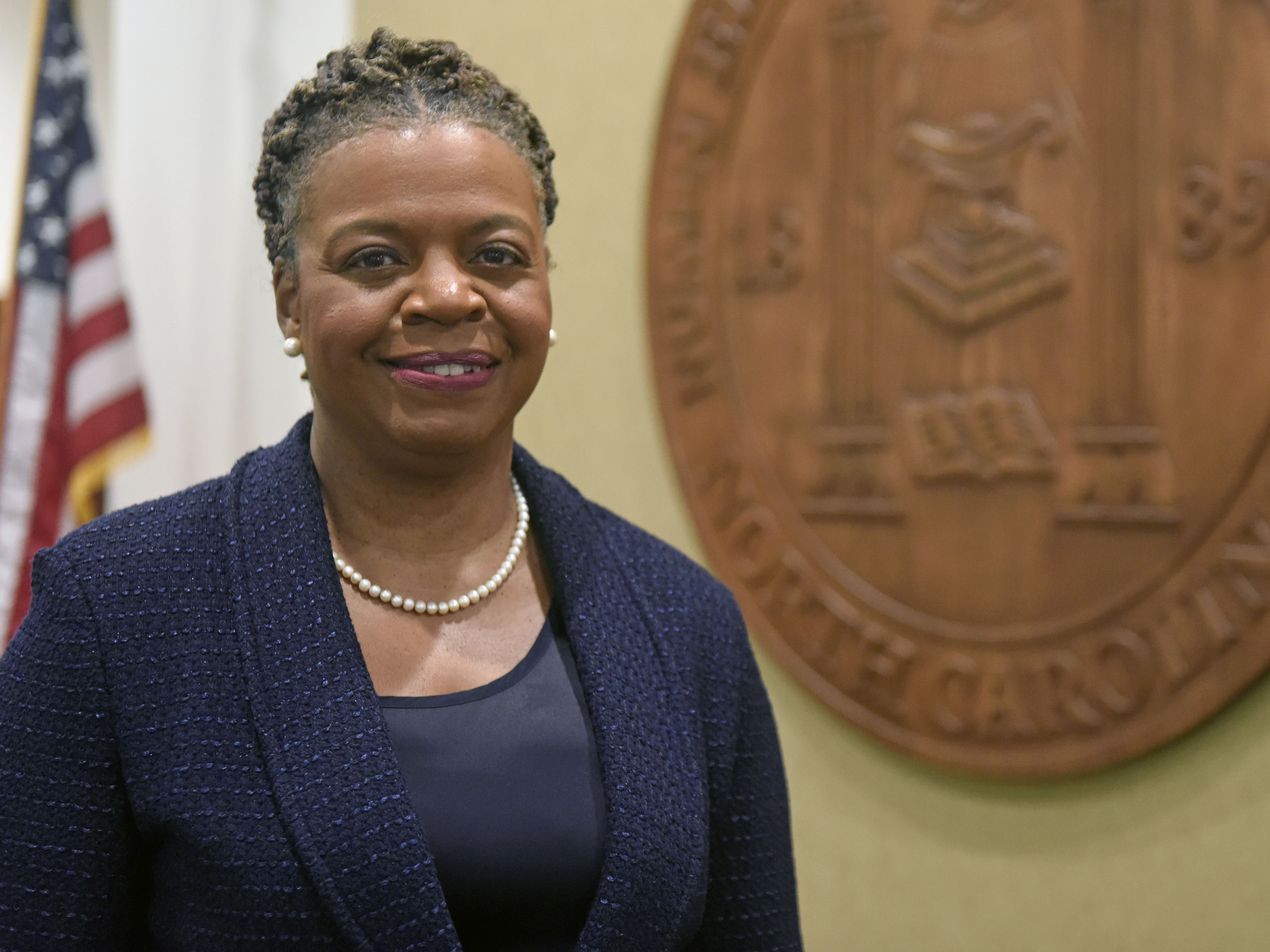The former chief justice of the North Carolina Supreme Court is teaching classes and mentoring students as a yearlong member of the Elon Law faculty.
A trailblazing North Carolina legal leader has joined the Elon University School of Law faculty as the university’s first named recipient of the Justice Sandra Day O’Connor endowed professorship.
The Hon. Cheri Beasley, who in 2019 became the first African-American woman to serve as chief justice of the North Carolina Supreme Court, will teach courses on appellate practice over the next year while delivering a public lecture and contributing to professional development opportunities for students and faculty alike.
“Chief Justice Beasley’s state and national leadership as a judge and her commitment to civic engagement make her an ideal professor for Elon Law students,” said Elon University President Connie Ledoux Book. “Like the law students, I also look forward to learning from her deep knowledge of the law and judicial process during future campus conversations.”
The Justice Sandra Day O’Connor endowed professorship was established to bring to Elon University distinguished legal figures whose contributions to society reflect the tenets and values of the first woman confirmed to the Supreme Court of the United States. A year after her 2005 retirement from the bench, O’Connor presided over Elon Law’s first Convocation when the school opened its doors to its charter class.
“I am honored to be Elon’s inaugural Justice Sandra Day O’Connor Professor of Law,” Beasley said. “We know what a maverick and trailblazer Justice O’Connor was to this nation. We know how actively engaged she was in the early days of the School of Law and how much she really believed in the ability of Elon Law to cultivate leaders.
“We also know that she was literally one of a kind as the first woman to serve on the Supreme Court and what a model she was for our nation, particularly for women lawyers, in a way that helps all students to believe in their fullest potential.”
Beasley served as a public defender in Cumberland County before she began her judicial career in 1999 as a North Carolina District Court judge. She was elected in 2008 to serve as an associate judge on the North Carolina Court of Appeals and, four years later, was appointed to the Supreme Court of North Carolina, subsequently winning election to the position in 2014.
North Carolina Gov. Roy Cooper appointed Beasley to serve as chief justice of the North Carolina Supreme Court following the 2019 resignation of Chief Justice Mark Martin. At the time, Beasley was only the fourth African-American woman in the country’s history to serve as chief justice of any state’s highest court.
Beasley also has served in several leadership roles in the North Carolina Bar Association, as a member of the N.C. Bar Foundation Endowment Committee, and as a member of the American Bar Association Standing Committee for Legal Aid and Indigent Defense.
Beasley holds a Master of Laws in Judicial Studies from Duke University, a J.D. from The University of Tennessee College of Law, and a bachelor’s degree from Douglass College of Rutgers University.
She holds honorary doctorates from Fayetteville State University and North Carolina Central University, and she is the recipient of the Distinguished Alumni Award from both The University of Tennessee Knoxville and Rutgers University.
Beasley has been inducted into The Douglass Society, the highest honor bestowed by Douglass College of Rutgers University, and is the recipient of multiple other awards and honors including the Fayetteville State University Chancellor’s Medallion, the North Carolina Association of Women Attorneys’ Gwyneth B. Davis Award, and The University of Tennessee Knoxville Trailblazer Award. She is also an inductee into the Rutgers University African-American Alumni Alliance Hall of Fame.
“We are so lucky to have Chief Justice Beasley join our law school community,” said Elon Law Dean Zak Kramer. “At every step of her career, Chief Justice Beasley has made service the foundation of her work. I can’t think of a better person to guide our students as they prepare to enter the legal profession.”
North Carolina’s 2022 Democratic nominee for the U.S. Senate recently concluded service as a Fall 2023 Resident Fellow of the Institute of Politics at Harvard University Kennedy School of Government. She has since joined the Raleigh office of Haynsworth Sinkler Boyd, P.A. as a shareholder in addition to her appointment at Elon University.
“I’m really excited about being a part of the Elon Law family,” Beasley said. “Elon Law students really have the whole world ahead of them. There are a wealth of opportunities available, and I’m excited about working together on leadership development and watching them succeed.
“This is going to be a fruitful relationship and I look forward to being a part of the community.”
About Elon University School of Law
Elon Law is the preeminent school for engaged and experiential learning in law. With a focus on learning by doing, it integrates traditional classroom instruction with a required, full-time residency-in-practice field placement for all full-time students during the winter or spring of their second year. The law school’s distinctive curriculum provides a logically sequenced program of professional preparation and is accomplished in 2.5 years, which provides exceptional value by lowering tuition and permitting graduates early entry into their careers.
Elon Law in downtown Greensboro, North Carolina, has graduated more than 1,500 alumni since opening its doors in 2006. Its annual enrollment now tops 440 students and the law school is regularly featured in PreLaw Magazine’s “Best Schools for Practical Training” rankings, reaching #5 in the nation in 2023.
The Elon Law Flex Program, a part-time, in-person program of legal study for working professionals in Charlotte, N.C., will begin in Fall 2024 following programmatic and campus approvals by the American Bar Association and SACSCOC, respectively.



